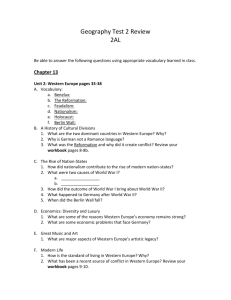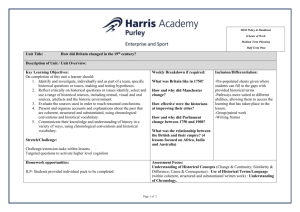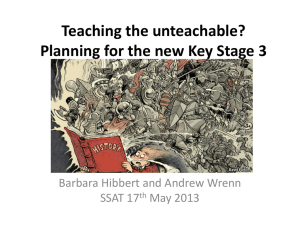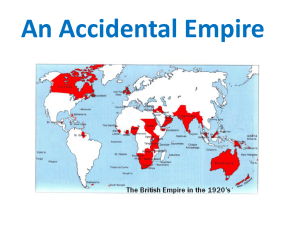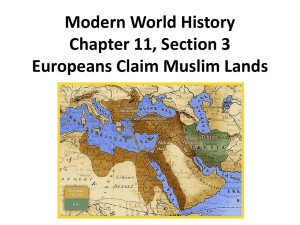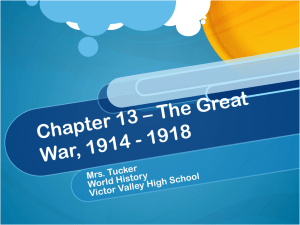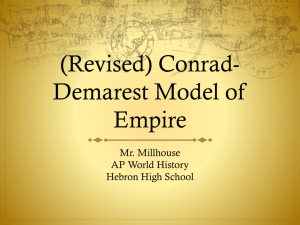********b
advertisement
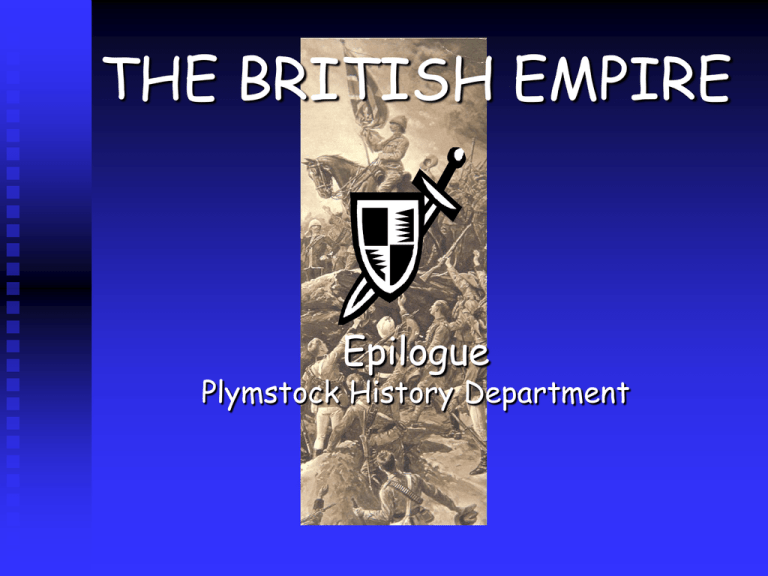
THE BRITISH EMPIRE Epilogue Plymstock History Department EPILOGUE Britain has always been a tiny group of islands . . . tiny in size, that is, though their effect on the rest of the world has been enormous. Remember these points? Ever wonder why so many other countries around the world speak English, drive on the left hand side on the road, have the Union Jack in their own flags? Ever wonder why our Queen is Queen of 27 other countries? Ever wonder why Britain gets involved in events all over the world, sends her army & navy everywhere, still owns little bits of land all over the planet? Ever wonder why some countries in the world play our sports like cricket and rugby whilst other do not? Ever wonder why so many of us have family living in places such as Canada, Australia, South Africa? Britain created an empire which changed the world – and made herself very rich in the process. The trouble is, ‘great’ deeds like that cost a lot – they cost a lot of pain and suffering. The native peoples that the Brits met were conquered, broken and sometimes even wiped out. Whilst not everyone in the conquering country benefits. If you had stopped a British conqueror and asked, ‘Why are you doing this?’ he (or she) might have said . . . If you’d asked them ‘How are you doing this?’ then honest empire-builders would have had to answer . . . Most British people believed their country was the . . . We call this patriotism The truth is that the only ‘free’ ones were the white natives of the British Isles (and even then life was usually miserable unless you were wealthy as you will have already studied). The British Empire did help to get rid of a lot of evils, like cannibalism and human sacrifice – but it taught the conquered natives other things instead, like how to love money and how to massacre with machines. Throughout the Twentieth Century, especially after the Second World War, the native peoples were slowly given back the lands that belonged to them. Some fought and died for that freedom – some were handed it by the Brits, who started to see how the world had changed. Empires were no longer a grand and glorious thing to have. This was called DECOLONISATION Since the Second World War, and Hitler’s attempts to build an evil empire, no one puts up with bullies any more. The British Empire is now dead but no one can quite agree on just how good – or bad – it was. Some Brits say . . . But you could remind them . . . Maybe you should ask the people who had to put up with it how much good the British Empire did them! On 15 August 1947 the Brits gave back India, Pakistan and Bangladesh to the native people. The British politician Winston Churchill said . . . 100,000 whites ruling 300,000,000 Indians What did the Indians think? They celebrated 15 August 1947 and freedom by tearing down the statues of the British Generals and the British rulers that the Brits had erected over the past 200 years. So was the British rule of India a good thing for India and for the world? Depends on who you ask! On your opinion. So now at the end of the course, how do you feel about the British Empire? Have you changed your mind? Do you feel guilty? Still proud? A little bit of both? Final thoughts….. Source A Ceylon (now Sri Lanka) was unified under British rule in 1815. Over the next 80 years the British built, 2,300 miles of road and 2,900 miles of railway. They raised the area used for farming from 400,000acres to 3.2 million area, the farm animals from 230,000 to 1.5 million, the post offices from 4 to 250, the telegraph lines from 0 to 1600 miles, the schools from 170 to 2,900, the hospitals from 0 to 65, the annual amount of goods shipped abroad from 75,000 tons to 7 million James Morris, ‘Pax Britannica’ 1970 Source B In the colonies our science and technology had improved standards of living and we were more civilised in our values. The history of the British Empire will be seen as a very good thing – A retired schoolmaster from Yorkshire 1953 Source C I hate the British for the wrong they have done India. Their Parliament makes laws for us and their government appoints a Viceroy to rule over us. The British are arrogant, despising our brown skins. Worst of all, the British have kept us poor. Our people work for slave wages in Britishowned cotton mills and on British-owned tea plantations Pandit Nehru, India's first Prime Minister 1947 The last word should lie with Nelson Mandela recalling his schooldays in Natal, South Africa during the 1920’s: ‘You must remember I was brought up in a British school, and at the time Britain was the home of everything that was best in the world. I have not discarded the influence which Britain and British history and culture exercise on us. We regarded it as the capital of the world and visiting the place therefore had this excitement because I was visiting the country that was my pride….You must also remember that Britain is the home of parliamentary democracy and, as people fighting against tyranny we look upon Britain to take an active interest and support in the fight against tyranny. ‘Few empires have equipped their subjects with the intellectual wherewithal to overthrow their rulers. None has been survived by so much affection and moral respect’ Lawrence James – The rise & Fall of the British Empire What do you think?
